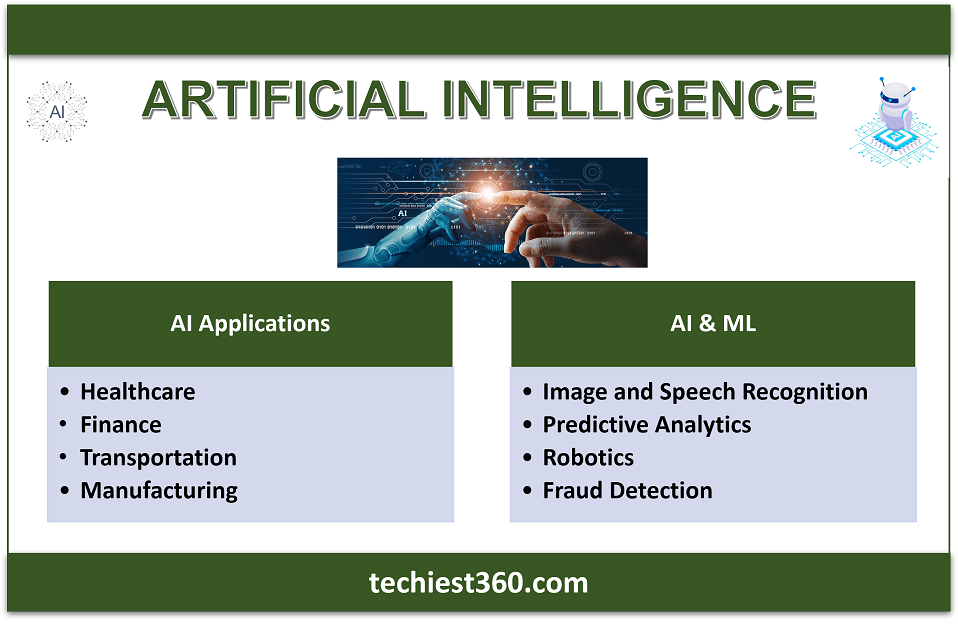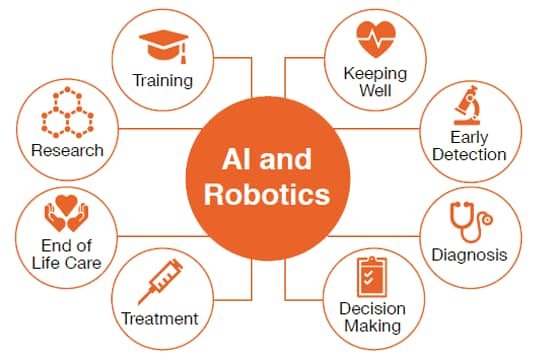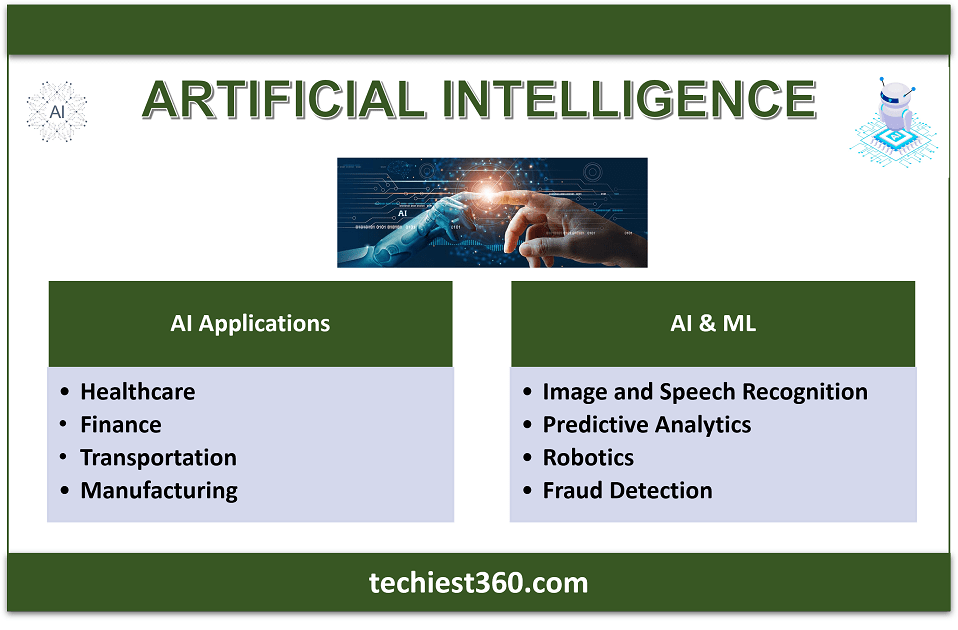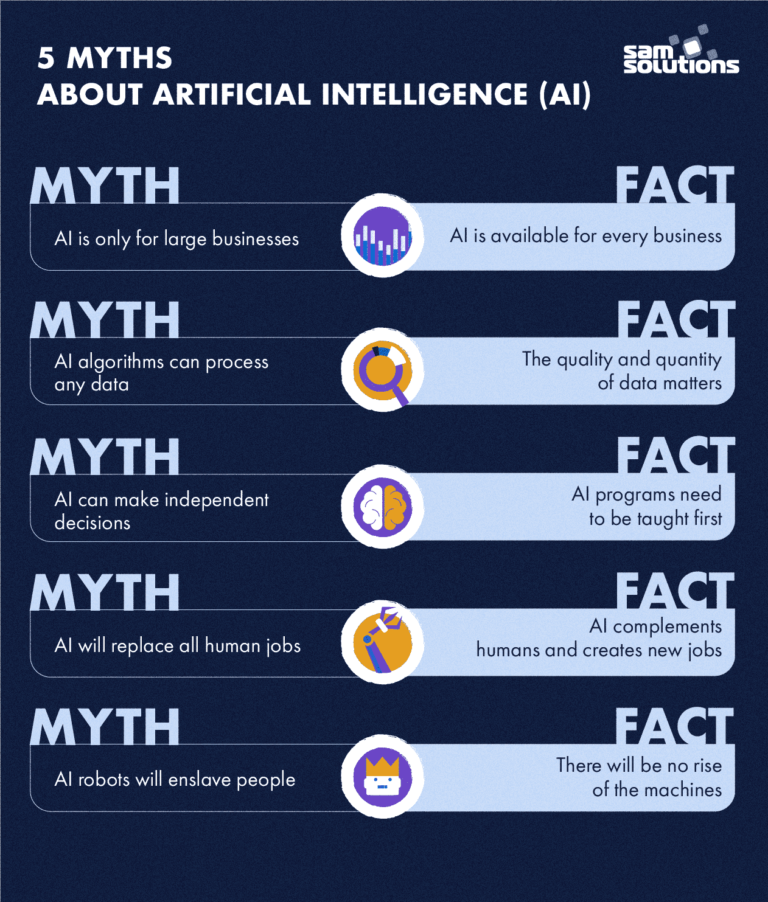AI In Different Fields, Such As Healthcare, Finance, Transportation, And Manufacturing

In today’s rapidly evolving world, artificial intelligence (AI) has emerged as a game-changer across various industries. From healthcare to finance, transportation to manufacturing, AI has revolutionized the way we work, live, and interact. With its ability to process and analyze vast amounts of data, AI has not only enhanced efficiency and productivity but also opened up an array of opportunities for innovation and growth. In this article, we will explore the transformative impact of AI in different fields, shedding light on how it has revolutionized healthcare, finance, transportation, and manufacturing, making our lives easier, more efficient, and safer. So, grab your seat and get ready to embark on a fascinating journey into the world of AI!
This image is property of miro.medium.com.
AI in Healthcare
AI applications in medical diagnosis
AI has made significant advancements in the field of healthcare, particularly in medical diagnosis. Through the use of machine learning algorithms and deep learning techniques, AI can analyze vast amounts of patient data and identify patterns that may indicate the presence of diseases or conditions. This can help healthcare professionals make more accurate and timely diagnoses, improving patient outcomes and potentially saving lives. AI can also assist in the interpretation of medical imaging, such as X-rays and CT scans, by highlighting areas of interest and aiding radiologists in their assessments.
AI-powered robotic surgery
Robotic surgery has revolutionized the field of healthcare, allowing surgeons to perform complex procedures with precision and minimal invasiveness. AI plays a crucial role in guiding and enhancing robotic surgery systems. By analyzing real-time data and using advanced algorithms, AI can assist surgeons in making precise movements while performing procedures. This results in improved surgical outcomes, reduced risks, and faster recovery times for patients. Additionally, AI enables robotic surgical systems to learn from past surgeries, allowing for continuous improvement and refinement of surgical techniques.
AI in genomics research
Genomics research involves analyzing and interpreting vast amounts of genomic data to better understand the genetic basis of diseases and develop targeted therapies. AI has greatly accelerated and enhanced genomics research by enabling the analysis of complex datasets. Machine learning algorithms can identify genetic variations associated with diseases, predict disease risk based on an individual’s genetic makeup, and identify potential drug targets. AI also facilitates the integration of genomics data with other types of medical data, such as patient records and clinical outcomes, to uncover valuable insights and improve personalized medicine.
AI for drug discovery
The process of drug discovery is time-consuming and costly. AI offers a promising solution by accelerating and optimizing various stages of the drug discovery process. AI algorithms can analyze large-scale databases of chemical compounds, predict their properties and potential biological activities, and identify promising drug candidates. This not only speeds up the identification of potential treatments but also enables researchers to explore a wider range of possibilities and target diseases that were previously considered challenging. AI-driven drug discovery has the potential to revolutionize the pharmaceutical industry and bring new treatments to patients faster than ever before.
AI in patient monitoring and personalized care
AI technologies are transforming patient monitoring and enabling personalized care. By continuously collecting and analyzing patient data, such as vital signs, medical history, and lifestyle factors, AI systems can identify early warning signs of deterioration or complications. This allows healthcare providers to intervene proactively and provide timely interventions, ultimately improving patient outcomes. AI can also help in personalized care by tailoring treatment plans and recommendations based on individual patient characteristics and preferences. This leads to more effective and efficient healthcare delivery, reducing unnecessary hospitalizations and improving patient satisfaction.
This image is property of miro.medium.com.
AI in Finance
AI in fraud detection and cybersecurity
The financial industry faces constant threats from fraudsters and cybercriminals. AI has proven to be an invaluable tool in detecting fraudulent activities and enhancing cybersecurity measures. By continuously monitoring and analyzing vast amounts of financial transactions and user behavior data, AI algorithms can identify patterns that indicate fraudulent behavior. This enables financial institutions to detect and prevent fraud in real-time, protecting both their customers and their own assets. AI also helps in strengthening cybersecurity by identifying and mitigating potential vulnerabilities and threats, such as malware and phishing attacks.
AI in algorithmic trading
Algorithmic trading, also known as automated or high-frequency trading, relies on complex mathematical algorithms to execute trades in the financial markets. AI plays a crucial role in algorithmic trading by analyzing large volumes of market data, detecting patterns, and making predictions about future market movements. AI-powered trading systems can execute trades faster and more efficiently than human traders, taking advantage of even the smallest market fluctuations. This improves trading performance and can generate significant profits for financial institutions.
AI for customer service and chatbots
AI-powered chatbots have become increasingly prevalent in customer service, providing efficient and personalized support to customers. By utilizing natural language processing and machine learning, chatbots can understand and respond to customer inquiries in real-time. They can provide 24/7 support, handle multiple customer interactions simultaneously, and resolve common issues without the need for human intervention. This not only improves customer satisfaction but also reduces the workload on customer service teams, allowing them to focus on more complex and specialized tasks.
AI in credit scoring
Credit scoring is an essential aspect of the financial industry, determining the creditworthiness of individuals and businesses. AI has transformed credit scoring by leveraging alternative data sources and advanced analytics techniques. Traditional credit scoring models heavily rely on limited financial data, such as credit history and income. AI algorithms, on the other hand, can analyze a broader range of data, including social media activity, mobile phone usage, and online behavior, to assess credit risk more accurately. This enables financial institutions to make more informed lending decisions and extend credit to individuals who may have been overlooked by traditional scoring methods.
AI-powered financial planning and wealth management
AI is revolutionizing financial planning and wealth management by offering personalized and data-driven solutions. AI-powered financial planning platforms can analyze an individual’s financial situation, goals, and risk tolerance to provide tailored and actionable advice. These platforms consider various factors, such as income, expenses, investment preferences, and market conditions, to optimize financial strategies and help individuals achieve their financial goals. Furthermore, AI enables automated portfolio management, taking into account market trends and risk profiles to make informed investment decisions. This increases efficiency, reduces management fees, and improves overall investment performance.

This image is property of www.pwc.com.
AI in Transportation
AI in autonomous vehicles
Autonomous vehicles are one of the most exciting applications of AI in transportation. AI algorithms and sensors enable vehicles to perceive and interpret their surroundings, making intelligent decisions in real-time. By analyzing data from cameras, radar, lidar, and other sensors, AI systems can identify objects, predict their movements, and navigate safely and efficiently. Autonomous vehicles have the potential to revolutionize the transportation industry, improving road safety, reducing traffic congestion, and transforming the way people and goods are transported.
AI for traffic management and optimization
Traffic management and optimization are essential for efficient and sustainable transportation systems. AI technologies can analyze real-time traffic data from various sources, such as sensors, cameras, and GPS devices, to understand traffic patterns and make predictions about congestion and travel times. This information can then be used to optimize traffic signal timings, suggest alternative routes, and better allocate transportation resources. By reducing congestion and improving traffic flow, AI-powered traffic management systems can reduce travel times, fuel consumption, and environmental impact.
AI in predictive maintenance
Predictive maintenance is vital for ensuring the reliability and safety of transportation infrastructure and vehicles. AI plays a crucial role in predictive maintenance by analyzing sensor data, historical maintenance records, and external factors to detect patterns and predict equipment failures. By identifying potential issues before they occur, transportation operators can schedule maintenance proactively, minimize disruptions, and save on costs. AI-powered predictive maintenance also enables the optimization of maintenance schedules, ensuring that maintenance activities are performed when they are most needed and avoiding unnecessary downtime.
AI in logistics and supply chain management
The logistics and supply chain industry heavily relies on efficient operations and timely deliveries. AI technologies are transforming logistics and supply chain management by optimizing various processes. AI algorithms can analyze vast amounts of data, such as historical shipping information, weather conditions, and demand patterns, to optimize route planning, scheduling, and inventory management. This results in improved operational efficiency, reduced transportation costs, and faster order fulfillment. AI also facilitates real-time tracking and visibility, enabling better coordination and communication between different stakeholders in the supply chain.
AI for smart transportation systems
Smart transportation systems leverage AI technologies to create more intelligent and connected transportation networks. AI enables the integration of various transportation modes, such as buses, trains, and taxis, into a seamless and efficient system. By analyzing real-time data from different sources, AI can optimize the routing of vehicles, predict passenger demand, and provide real-time travel information to users. AI-powered smart transportation systems can improve overall transportation efficiency, reduce travel times, and enhance the overall passenger experience.

This image is property of techiest360.com.
AI in Manufacturing
AI in predictive maintenance and quality control
Predictive maintenance and quality control are critical for ensuring smooth and efficient manufacturing operations. AI-powered systems can analyze sensor data from production equipment, detect anomalies, and predict potential failures. This enables manufacturers to schedule maintenance proactively, avoid unexpected downtime, and optimize equipment performance. AI algorithms can also analyze data from various stages of the manufacturing process to identify quality issues and defects. This proactive approach to maintenance and quality control helps manufacturers reduce costs, improve productivity, and deliver high-quality products to customers.
AI-powered robotics and automation
AI-powered robotics and automation play a crucial role in transforming the manufacturing industry. By combining AI algorithms with robots, manufacturers can automate repetitive and labor-intensive tasks, improving efficiency, and reducing costs. AI-enabled robots can adapt to changing circumstances, collaborate with human workers, and perform complex tasks with precision. This not only increases productivity but also enhances worker safety by removing them from potentially hazardous environments. AI-powered robotics and automation have the potential to revolutionize manufacturing processes and drive innovation in the industry.
AI in supply chain management
Supply chain management involves coordinating and optimizing the flow of goods, information, and finances across the entire manufacturing process. AI technologies provide valuable tools for improving supply chain management. AI algorithms can analyze vast amounts of data, such as sales forecasts, inventory levels, and supplier performance, to optimize inventory levels, streamline logistics operations, and reduce costs. AI-powered supply chain management systems can also analyze unstructured data, such as customer feedback and social media sentiment, to identify emerging trends and demand patterns. This enables manufacturers to make data-driven decisions and respond quickly to changes in the market.
AI for demand forecasting and inventory optimization
Accurate demand forecasting and effective inventory management are essential for manufacturers to meet customer demand while minimizing costs. AI algorithms can analyze historical sales data, market trends, and external factors, such as weather conditions or economic indicators, to forecast demand more accurately. This helps manufacturers optimize production schedules, adjust inventory levels, and ensure the availability of products when needed. By reducing stockouts and excess inventory, AI-powered demand forecasting and inventory optimization systems help manufacturers improve customer satisfaction, minimize costs, and increase overall operational efficiency.
AI for product design and optimization
AI is revolutionizing the product design process by enabling manufacturers to create innovative and optimized products. By analyzing vast amounts of data, including customer feedback, market trends, and competitor analysis, AI algorithms can provide valuable insights and recommendations during the product design phase. AI can also assist in creating virtual prototypes and performing simulations, allowing manufacturers to test and optimize product designs before physical production. This iterative and data-driven approach to product design helps manufacturers reduce time to market, minimize costs, and deliver products that meet customer needs and preferences.






